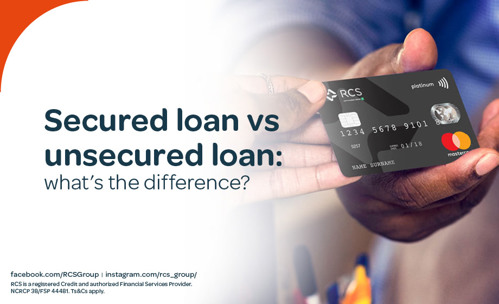Secured Loan vs Unsecured Loan what's the difference?
11 AUGUST 2023
Among the many terms that you need to know to be financially educated, knowing if you need or want to take out a secured vs unsecured loan is crucial. This will help you avoid making unwise borrowing decisions, and to choose a loan that is beneficial to you. Some milestones and moments in life can require extra financial support to reach. Taking a loan out can help us reach them. However, the loan process is not a simple one as there are many things to take into consideration. A key component of this is knowing the difference between secured and unsecured loans.
Some milestones and moments in life can require extra financial support to reach. Taking a loan out can help us reach them. However, the loan process is not a simple one as there are many things to take into consideration. A key component of this is knowing the difference between secured and unsecured loans.
Secured Loans
So, what is a secured loan? Lenders issue loans with the promise that you will pay the loan back. In general terms, secured loans are taken out against collateral or an asset of yours to protect the lender from the risk of loss if you fail to repay the loan.
These assets can be a piece of property, a car, or another asset that has monetary value. When you do not pay back the loan after the loan term, or default your loan, the lender has the right to take possession of the collateral. The lender will then sell the asset to help pay off your debt. Home equity loans and mortgages use your house as collateral, while personal loans and credit cards need a cash deposit.
Be aware of what could trigger a foreclosure or the possession of your assets to avoid losing them. A secure loan is only a good idea when you’re certain it is the right choice for you and that you are conscious of what could happen if you fail to make payments.
Unsecured Loans
Unlike secured loans, unsecured loans don’t use any collateral or assets to protect the lender from risk. The loan is issued solely based on your creditworthiness and signing your loan agreement. These loans are thus considered a higher risk for lenders and creditors as they could stand to lose profit if you do not pay back the loan.
This means that if you do not pay back the loan in time, the lender cannot take your property or assets. Examples of unsecured loans are credit cards, personal and student loans. As there is no security backed against taking out an unsecured loan, the application process in terms of your credit score and reliability can be more rigorous. You will also need a stable income to be approved for this type of loan, which can be a smaller loan amount compared to secured loans.
What is the difference between a secured and unsecured loan?
Secured loans have lower interest rates as they are considered less risky for the lender as they have an asset as collateral. While unsecured loans have higher interest rates to make up for the fact that there is no collateral. The major difference between these two types of loans is that you could stand to lose more with an unsecured loan while defaulting on a secured loan will not risk an asset to repossession.
Depending on what type of loan you will take out, the choice between secured or unsecured may not be up to you. For example, mortgages and car loans are always secured loans.
What are the disadvantages of a secured vs unsecured loan?
As stated above, the main disadvantage of a secured loan is that you could lose the house, car, or cash deposit against which the loan was taken out if you do not make payments in time. If your asset doesn’t cover the full amount of debt due, you will also need to cover the remaining balance. Like all debt, defaulting on your loan can affect your credit history and credit score.
With unsecured loans, if you do not repay your loans in time your lender could put your account into collections or take legal action. These also fall under your credit history for seven years. They can be a warning for future lenders if you approach them to take out another loan.
What are the main advantages of a secured vs unsecured loan?
Either secured or unsecured loans give you the opportunity to grow a good credit history and credit score if you stick to making payments on time. However, the main advantage of unsecured loans is that they do not take possession of your assets, when you fail to repay the loan, your assets are still protected. This means that you do not need to worry about extra losses.
With secured loans, you have greater access to credit as the collateral allows the lender to take more risk with your loan agreement. This type of loan is thus easier to get and apply for. Secured loans can also help you make a larger contribution to the milestone that you are aiming towards, for example growing your business or owning a new car. However, remember to be mindful of what you can afford.
When you find yourself in the position of needing to take out a loan, make sure that you compare and research which type of loan and its details will be best suited to your financial situation. It’s best practice to equip yourself with knowledge about the terminology of loans so you can avoid harming your credit history and start building a good credit score with either an unsecured or secured loan.



